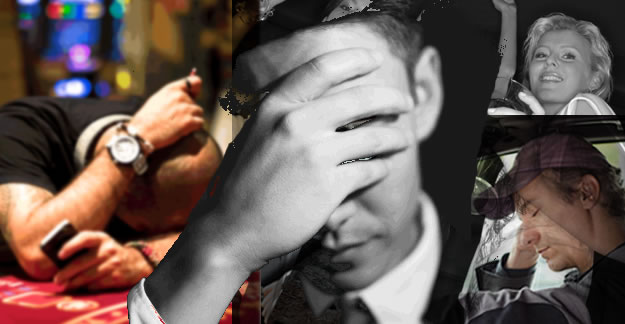There are 2 main categories of drugs for Parkinson’s Disease, and both have powerful side effects: levodopa, which makes many patients shaky with dyskinesia, and dopamine agonists, which can make turn people into gamblers, sex addicts or hit them with ‘sleep attacks’ — including when they’re driving. This is the story of DA.
At least 1 million people in the US and an estimated 10 million worldwide live with Parkinson’s, making it the second most common neurodegenerative disorder (Alzheimer’s ranks first). Parkinson’s disease, a disorder of the central nervous system, is caused by a degeneration of nerve cells in certain parts of the brain that produce a neurotransmitter called dopamine. Dopamine, commonly known for it’s role in controlling the brain’s reward and pleasure center, is partly responsible for starting a circuit of messages that coordinate normal movement.
In the absence (or with substantial reduction, more than 80% percent of the normal level) of dopamine, the neurons — called dopamine receptors — in the brain’s striatum are not adequately stimulated. In simple language, as a person’s brain slowly stops producing dopamine, a person has less and less ability to regulate his or her movements, body, and emotions. The result is impaired movement with tremors, slowness, stiffness or balance problems. Lesser known symptoms include depression, apathy and dementia.
After examining 2.7 million reports of drug reactions submitted to an FDA database between 2003 and 2012, researchers published a study in JAMA Internal Medicine that independently corroborated that a disproportionate number of people living with PD have reported impulse control disorders.
The study results reflect that although dopamine medications (such as Mirapex, Requip and Neupro) are essential to treating Parkinson’s Disease (PD), the challenge is to find a balance between high and low levels of dopamine. Long-term exposure to dopamine medications, especially dopamine agonists (DAs), can cause a hypersensitivity to dopamine. The body overreacts, and this in turn can lead to an impulse control disorder (ICD) — a group of behaviors that includes gambling, uncontrollable shopping, compulsive eating, a sudden obsession with sex, punding (stereotypic, complex, and repetitive behavior involving meaningless activities) — as well as a related disorder, excessive daytime sleepiness.
Impulse Control Disorders, Up Close and Personal
Interestingly, Daniel Weintraub, MD, associate professor of psychiatry and Neurology at the Perelman School of Medicine at the University of Pennsylvania, says that ICDs are most likely to manifest in men as gambling and hyper sexuality, whereas in women it expresses as shopping and overeating.
Needless to say, these compulsive behaviors can have serious repercussions.
“I’ve seen marriages break up and lives ruined as a result of dopamine agonists,” says Howard Weiss, director of the Parkinson’s Disease and Movement Disorder Programs at the LifeBridge Health Brain & Spine Institute in Baltimore. “I’ve had at least three patients who have lost their homes because of bankruptcy after taking the drugs. It sounds like a joke, but it’s not.”
What’s more, ICDs are shockingly common. Weintraub cites a study that demonstrated about 14% of people with PD experience 1of 4 of the typical ICD behaviors. He says his own guess is more like 17% to 20%, perhaps even 25%.
The reason that ICD might be even more prevalent than statistics show lies in the fact that they can easily slip under a doctor’s radar. Many patients aren’t forthcoming about the symptoms, and doctors may not take the time to ask the right questions.
“Most doctors have no idea how to diagnose ICDs,” says Weiss, “and most patients are in the dark.”
He says when he asked one elderly patient taking one of the drugs if she ever gambled, she replied, “Gambling is the work of the devil.” “But she had been buying hundreds of dollars’ worth of lottery tickets a week, a habit she didn’t consider to be gambling,” he says.
At every visit, Weiss suggests, “The doctor has to ask patient and spouse about unusual behavior. A big red flag, he says, is when patients complain of not sleeping. This is normally “code” for increased computer use, which may include pornography and internet gambling, and punding (performance of repetitive, mechanical tasks). Here’s a closer look at some of the common types of ICDs.
Sleep Attacks
One of the most dangerous of the impulse control disorders is what’s called sudden sleepiness or “sleep attacks.” It’s a major side effect of all the agonists and can have serious consequences if they occur while driving.
Jim Morgan, a partner at Squire Patton Boggs, a global law firm who was diagnosed with Parkinson’s disease about six years ago, remembers “periods of incredible drowsiness that can come on pretty suddenly. It’s hard to describe, but real fogginess. I could be in the car driving, only to wake up to find myself changing lanes. Mirapex was the worst for drowsiness; I’ve met several people who totaled their cars with it. It’s scary — you almost can’t fight it when it kicks in.”
Gambling
Paul Schroder, who had early onset Parkinson’s disease that was diagnosed almost 15 years ago, once gambled away $30,000 at a casino. “It happened when I was 40 and new to the drugs. I wish I had known about the possibility that a gambling addiction could happen,” he says. “I never heard anything about it. I couldn’t drag myself away from it. It’s one of the natural consequences of dopamine — it increases the desire for pleasure centers to be stimulated.”
For a while, he went off Mirapex, but now that he’s living at home with his parents, with no access to casinos, he’s back on a generic form of the drug. He has a better handle on what’s happening, he says, and has more control of the outcome.
Not as much was known about ICDs when Schroder was in the throes of gambling addiction. Now, says Dr. Weintraub, you would definitely screen “for possible risk factors: younger age [A Parkinson’s disease diagnosis for someone 21 to 40 years old is considered “young” or early onset Parkinson’s] , gender differences, family and personal history.”
Or as Christopher Hess, assistant professor of Neurology at the University of Florida Center for Movement Disorders and Neurorestoration says, “A single guy with a history of impulsivity is a less likely candidate for dopamine agonists.” If this type of screening had been in place when Schroder was first diagnosed—a single, younger man with a predilection for gambling—he might have saved thousands of dollars.
DAWS Risks
Tapering down, or stopping dopamine agonists (under the care of a doctor) can provide relief from impulsive behaviors. For some, going off the medication completely is not an option or withdrawal symptoms can be quite severe.
Dopamine agonist withdrawal syndrome (DAWS) was first recognized in 2010. One increasingly viable way to decrease medication is by opting for deep brain stimulation (DBS) surgery (typically post-surgery, a person can reduce medications).
DBS is used to treat several disabling neurological symptoms such as tremors, rigidity and movement problems and is also used to address dystonia (involuntary muscle contractions that cause slow repetitive movements). The procedure is only used for patients whose symptoms can’t be controlled with medications yet only those who improve to some degree after taking Parkinson’s drugs benefit from DBS. Although most people will still need to take medication after undergoing DBS, they’re able to reduce their reliance on the drugs.
Black Box Warning
Weiss doesn’t believe that improved screening techniques and monitoring is enough.
“I don’t think DAs are that helpful for PD,” he says. “They were overutilized in the 1990s, when the prevalent protocol was to delay levodopa. But these days, there is no compelling reason to prescribe them. I think they should have a black box warning — it’s one ways of getting a doctor’s attention.” (A black box warning is the strictest warning put in the labeling of prescription drugs or drug products by the Food and Drug Administration (FDA) when there is reasonable evidence of an association of a serious hazard with the drug.)
“The benefits of dopamine agonists are overestimated, and the risk is underestimated,” he adds.
Study authors not only called for a black box warning, but also “urged doctors to vigilantly monitor people taking these medications and to counsel them and their families about the risk of serious impulse disorders.” The study authors noted “that people at higher risk for impulse control disorders should not take dopamine agonists — including people with a history of such disorders or a personal or family history of obsessive-compulsive disorder, bipolar disorder, impulsive personality, alcoholism, drug abuse, or other addictive behaviors.”
As the risks become clearer, both patients and doctors are becoming better informed about how to ensure safety. Patients need to educate themselves about DA side effects, involve family members and friends in monitoring their behavior for possible ICDs, and inform their physicians if they experience ICDs or DAWS. As for the clinicians who use DAs, the imperative is clear: Avoid prescribing high doses of DAs, closely monitor DA-treated patients for signs of ICDs, and finally, warn patients of the risks of withdrawal before they start using it.
Related Articles about Parkinson’s Disease
- The End for Levodopa Phobia (National Parkinson Foundation)
- Stronger Warnings Urged for Drugs Linked to Impulse Control Disorders (Parkinson’s Disease Foundation)
- Management of Psychosis in Parkinson’s Disease (Psychiatric Times)
- Parkinson’s Disease Handbook (pdf) (pdf) (American Parkinson’s Disease Associates Inc.)
- Depression, anxiety, and psychosis in Parkinson’s disease (BC Medical Journal)






